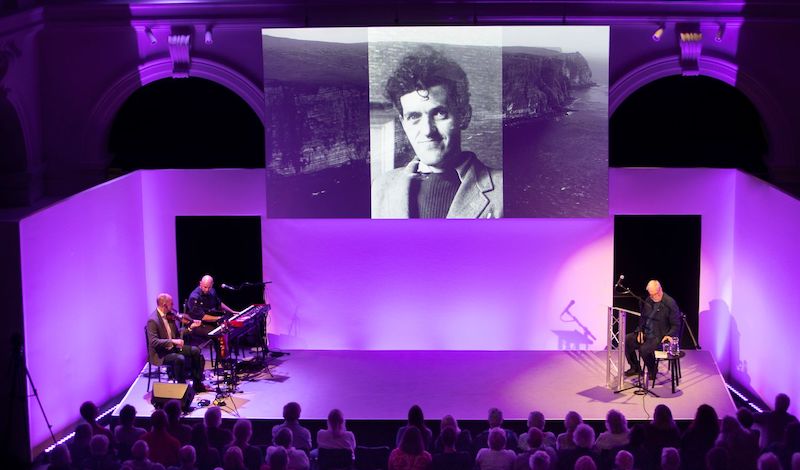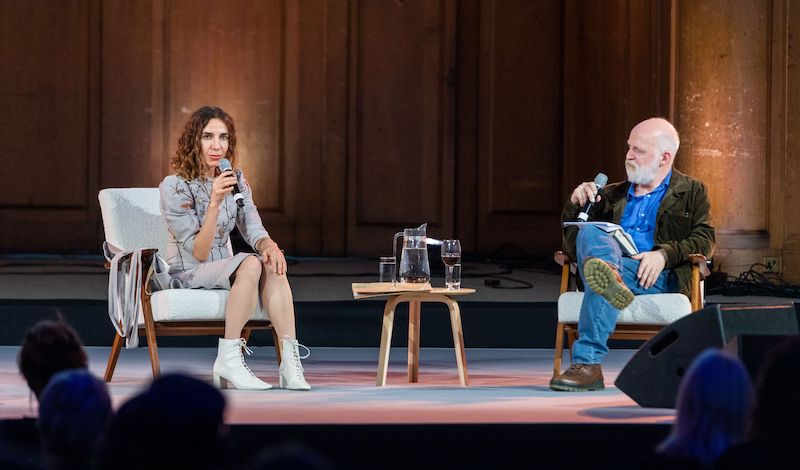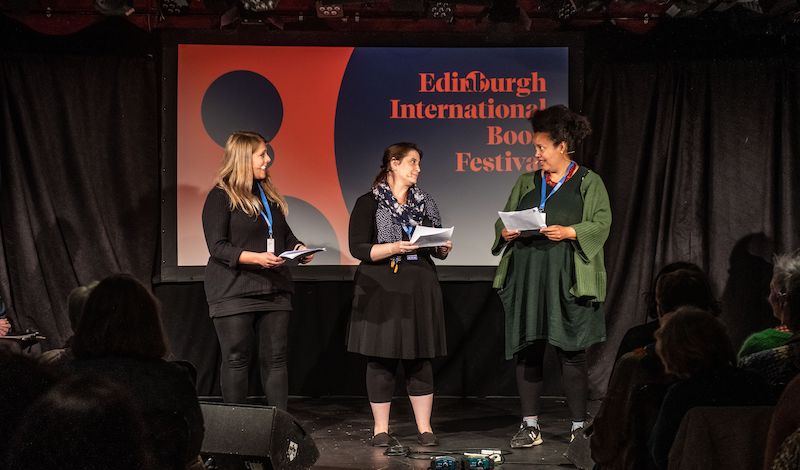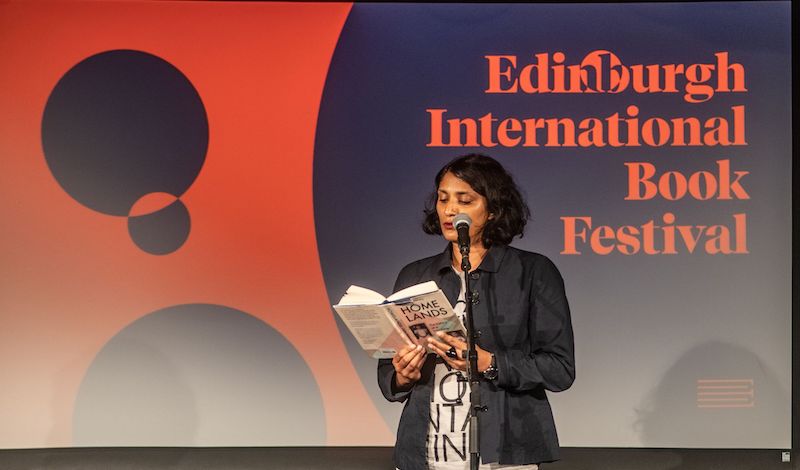Book Festival Round-up
Theatre-interests at the Edinburgh International Book Festival
By Hugh Simpson
Although the main draw at the Book Festival for theatregoers is undoubtedly the magnetic This Is Memorial Device, there are also always plenty of other performances of interest.
One of the most satisfying was undoubtedly Beyond The Swelkie, a celebration of the centenary of Orcadian writer George Mackay Brown featuring poet Jim Mackintosh and musicians Duncan Chisholm and Hamish Napier.
Poems from the collection of the same name, co-edited by Mackintosh were featured, seamlessly intertwined with film and music. It obviously benefited from being a production that had previously been staged, with Graeme Roger and Alan Mackinnon’s technical presentation being first-rate. The combination of the wonderful, lyrical music and the poetry was a winning one; the films, with recorded voiceovers by the musicians, were both informative and attractive.
If any criticism could be levelled it would be that too little of Brown’s original work was featured. This was also true of a somewhat more frustrating celebration featuring Fiona Paterson, Alan Riach and James Robertson. This commemorated not the centenary of a birth but of the first time Christopher Murray Grieve used the pen name of Hugh McDiarmid.
adversarial
Although billed as an adversarial occasion, there was a great deal of agreement on display in what was a largely anecdotal exploration that was always entertaining. However, any newcomers to McDiarmid (of which admittedly there were undoubtedly few in the audience) would have found little explanation of why the poet remains such a towering and controversial figure.
On several occasions it was admitted that he ‘remains problematic’ but this was skated over when it demanded to be met head on. However, if there was the occasional whiff of self-congratulation, this just provided proof of the cultural confidence in Scotland that McDiarmid in many ways single-handedly kickstarted.
His technique in creating a synthetic Scots – based on use of a dictionary, personal recollection and pure invention – found an unexpected echo in the works of PJ Harvey, whose recent epic poem Orlam is apparently the first book published in the Dorset dialect for a century.
The idea of performers turning to the written word of course, has a considerable recent history that is not always distinguished. Yet Harvey bears no resemblance to comedians churning out children’s books or TV presenters dabbling in crime fiction.
Her commitment to poetry is clearly genuine, and her epic poem of Ira-Abel, the nine-year-old girl-boy, Orlam, the all-seeing dead lamb’s eyeball and the dead soldier Wyman-Elvis was performed with all the commitment and authority one associates with Harvey’s musical performances.
a compelling work
It is a compelling work with echoes of the ballad tradition, folk horror and Geoffrey Hill; any suspicion Harvey is not taking the process seriously was soon eliminated by the discussion with her poetic mentor Don Paterson, not a man known for his tolerance of poetic dilettantism.
Paterson’s public persona is not often mistaken for a ray of sunshine, but in his earlier appearance with Kathleen Jamie he declared that his latest book The Arctic verges on the diabolical, with the current climate he says being ‘grim as hell’, with its ‘convergent apocalypses great for a poet, but much not good for anyone else’.
In particular Easter 2020, his scathing account of the early days of the pandemic, reduced the audience to stunned silence.
Jamie has of course always dealt with the natural world and lamented how many times we seem to be hearing the word ‘unprecedented’ in recent years. An account from her most recent prose book Surfacing of the past of the Yup’ik people being uncovered by the thawing tundra was at once a celebration and a terrible warning.
Neither poet necessarily feels at home committing themselves to ‘issue-led poetry’, but as Jamie said ‘it’s all hands on deck now’.
There was even an elegiac feel to the appearance of Howard Jacobson, generally one of the most puckish and raconteurial of performers. Pleading laryngitis, he talked about his memoir Mother’s Boy. He discussed his family and said the book was in part and attempt to deal with ‘the people he had wronged’. An acute awareness of the average age of many Book Festival audiences meant that his revelation that his next book was to deal with deviant sex among senior citizens was always going to be well received.
The Wee Red Bar saw the recording of the first of Stellar Quines’ new Quines Cast podcast venture, as artistic director Caitlin Skinner and Hannah Lavery hosted a distinguished series of performers on the theme of ‘the city’.
A short play by Sara Shaarawi, and Chitra Ramaswamy reading from her Homeland, explored the themes of memory, place and home, while others from different spheres, including Denise Mina and Karine Polwart investigated how cities can be places of sanctuary and freedom but also of vulnerability, and posited the idea of a feminist city. An attempt to create an intersectional feminist podcast, the next instalment will be recorded at Jupiter Artland and will be broadcast later in the year.
Meanwhile, Macastory’s Meadows Mysteries Walking Tour proved a hit with family audiences, with Fergus McNicol and Ron Fairweather, once again leading groups from the Book Festival to explore the surrounding area. Following their previous New Town forays, Victorian detectives Titus Wellpecket and Symington Smythe entertained families with the history of the Meadows with dressing up, quizzes and songs about trees, football and Sherlock Holmes.
The return to largely in-person events means the corresponding presence of those staples, chairing that ranges from the brilliantly elucidatory to the scattily near-chaotic (and sometimes both at once), and the all-too-familiar audience questions that are actually rambling disquisitions on the speaker’s personal politics.
chimera
This year the latter seem to focus to a great extent on the threat of ‘cancel culture’ at the largely imagined hands of the ‘woke’. The horrible irony of fixating on this chimera after what actually happened to friend of the festival Salman Rushdie (whose words are gratifyingly read at the start of most events) seems lost on many. That the country’s real direction is being decided by a handful of party members, not a largely confected bunch of culture warriors, also seems to pass them by.
While many still obviously lament the loss of Charlotte Square Gardens, Nick Barley and his team have made more than a decent fist of the still comparatively new surroundings. The big screen is better placed (although underused) and signage is much better, although the information point and box office are oddly hidden behind the entrance.
Provision of refreshments has improved, although problematic in the evening when – due to the use of Tollcross’s cavernous Central Hall for the biggest events – the whole site is much more deserted than has been the case in previous years. The range of venues is impressive and attractive, although flat floors, no rake on seats and low stages do make for problems with sightlines – which is also the case at Central Hall.
The announcement of the move along the road to the Futures Institute at the old Infirmary at Quartermile does admittedly give the whole venue a temporary air, something that is exacerbated by being staged in a working building.
Despite all this, the feeling of the book festival being the most congenial and inspiring place to spend time at the festival has to a great extent returned. Something that has perhaps not come back to the same extent is the size of the audience, with many events that would have expected to sell out immediately still not full on the day.
It may be the cost of living crisis, the move from Charlotte Square, or that venerable audience being reluctant to return to crowded spaces, or a combination of all three but it is certainly noticeable.
Nevertheless, the whole site exudes that air of civilisation that is unique to the Book Festival.
With thanks to Emily Simpson, Claire Hutchins and Archie Dibdin for additional reporting.
The Book Festival continues until 29 August
Many events are available to watch online on a pay-what-you-want basis for a short period after they happen.
The next Quines Cast will be recorded at Jupiter Artland on Saturday 27 August. Details at https://stellarquines.co.uk/show/quines-cast/
ENDS






















